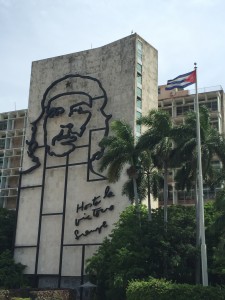Report of NNOC National Meeting in Chicago
The 2016 meeting of the National Network On Cuba was held November 18-20 in Chicago, IL. All events took place at the University of Illinois, Chicago UIC) which was very generous in hosting us and allowing the NNOC to use their facilities. This was the first meeting to be held outside of Washington DC or New York City in many years due to the historic inability of Cubans to travel to and within the United States because of U.S. imposed restrictions on travel by Cubans. The Chicago Committee worked for months planning the meeting and the results were quite successful. Cuban representatives at the meeting included ICAP North American Director, Sandra Ramirez, Leima Martinez, official of the North America Division and Miguel Fraga, First Secretary of the Cuban Embassy in Washington DC.
The weekend opened with a reception on Friday evening at the UIC Great Cities Institute, whose director, Teresa Cordova, welcomed us with a report of the history of UIC in the struggles of students and especially working students in Chicago.
The business meeting took place on Saturday and Sunday, November 19 and 20. We were hosted by the Rafael Cintron Ortiz Latino Cultural Center at UIC at their beautiful meeting space which was filled with inspiring murals of Latino struggles. There were voting representatives from approximately 30 NNOC organizations among the 60 attendees. Five new groups applied for NNOC membership and were unanimously accepted: Albany Cuba Solidarity, Altruvistas, Pittsburg-Matanzas Sister Cities Partnership, Richmond-Regla Cuba Friendship Committee, and Seattle/Cuba Friendship Committee. AAPRP renewed their membership and other groups are considering joining the network.
A by-law change that was proposed in the 2015 meeting was discussed and accepted by a unanimous vote. The amendment states: “Any NNOC member group that has neither paid dues nor participated in a NNOC meeting for 3 years will be considered to have relinquished membership and will be required to reapply for membership should they desire to rejoin the network.” Another change relating to dues payment schedule was withdrawn.
Election for co-chairs and treasurer was held and current co-chairs Alicia Jrapko, Cheryl LaBash, and Nalda Vigezzi, and treasurer Don Goldhamer were all re-elected unanimously.
A solidarity message from the Canadian Network On Cuba to the NNOC meeting was read highlighting the actions in Canada as well as sending greetings of friendship and solidarity.
The opening presentation was our ICAP friends who talked first about the tremendous victory at the United Nations where, in 2016, for the first time, the vote to condemn the United States blockade passed with no opposition (191 in favor of the resolution, 0 opposed, 2 abstentions). The also talked about their visits to area cities as guests of NNOC member groups: Pittsburgh, Minneapolis, Milwaukee, in addition to Chicago. Sandra Ramirez also brought greetings from all of ICAP and reported on their work in the past year.
The first panel focused on OFAC prosecutions of travelers to Cuba and of IFCO/Pastors for Peace.
Peggy Valdez outlined the threats to revoke the 501c3 tax status of IFCO. The alleged violations are minor record keeping issues but addressing those areas has been time consuming and costly for IFCO and threatens its 50 years of work. IFCO has obtained an offer of fiscal sponsorship from the Alliance for Global Justice should they lose the case. They are continuing to solicit letters of support to the IRS, White House, and Congress.
Art Heitzer reported on the renewed enforcement of travel restrictions and prosecution of traveler, Albert Fox whose organization, Alliance for Responsible Cuba Policy Foundation, has been charged as an unlicensed travel provider due to 2 trips: one opening a dialogue between the U.S. and Cuban oil drillers resulting in an agreement protecting the Gulf of Mexico from environmental disasters. The second trip brought civic leaders from Tampa, FL to Cuba to celebrate the first direct flight from Tampa in over 50 years. He faces a penalty of $100,000 for “trading with the enemy”. His legal defense team can be contacted to offer support or for more information at: artheitzer@gmail.com.
The Venceremos Brigade conducted an interactive session addressing issues of justice, anti-oppression, anti-racism and how the lessons from Cuba can help us in our neighborhood work; how collective energy can result in a better world. The priority of the VB is anti-oppression/anti-racism in the U.S. and in Cuba. Discussion involved how people have taken up the issues of race in our communities and in our work. Breakout groups focused on discussions of anti-oppression and anti-racism.
The ELAM panel included 2 graduates of the medical school; Erlyne Hyppolite and Abeeku Ricks as well as Leima Martinez who serves as ICAP liaison to ELAM. Both Erlyne and Abeeku talked about how their education focused on becoming a doctor who is socially aware, whose concern is the patient and his/her family and community, how they learned that to talk to the patient first, ask questions and listen to answers. They talked about the challenges of living in a new country, new language, new culture, new food, etc. Their first hand report was enthusiastic, heartfelt, and authentic. We are all grateful for their contributions to the U.S. medical community.
The final panel was Ethical Travel with Bob Guild and Walter Turner, founders with Gail Reed of the organization RESPECT (Responsible and Ethical Cuba Travel) and Sandra Ramirez. Respect is focused on purposeful travel, respecting the culture, institutions, sovereignty of Cuba and is working to ensure that people from the U.S. engage in mutual learning in areas of education, health, culture, etc. whether they travel on academic, people to people, religious, sister city, or other delegations.
A motion was made that the NNOC endorse a conference to be held in New York City in March, 2017 focused on completely lifting the blockade and what “normalization” means. Motion passed unanimously.
Miguel Fraga, First Secretary of the Cuban Embassy concluded the day with a power-point presentation including demographic achievements, comparisons of Cuba’s indices with other countries, and mentioned such underreported facts as the publication in Granma of speeches by both President Castro and President Obama, Cuba’s offer to send medical personnel to New Orleans, the financial damage of the blockade ($4.6 Billion in 2015 and $125.9 Billion total), the working and diplomatic relationships with 190 U.N. member nations, the history of U.S. based terrorism against Cuba, the increasing opposition to U.S. Cuba policy by the people of the United States, the overwhelming interest in travel to Cuba from people in the U.S. (nearly 137,00 visited Cuba in the first 6 months of 2016), the medical cooperation and medical research between Cuba and the U.S., bills in Congress to permit all travel. Fraga reiterated that regardless of the political situation in the U.S., Cuba will not change its principals.
On Saturday evening, a public meeting was held in the UIC Student Center: “An Evening Of Solidarity With Cuba.” The hundreds of people attending the program were able to view, upon entering the hall, images of Fidel taken by Roberto Chile and compiled for Fidel’s 90th birthday. In a bittersweet moment, given the passing of Fidel just one week later, a cake was shared to commemorate his 90th birthday. Speakers included First Secretary of the Cuban Embassy Miguel Fraga, ICAP officials Sandra Ramirez and Leima Martinez, Jose Lopez, brother of Puerto Rican political prisoner Oscar Lopez Rivera, Aislinn Pulley, co-founder of Black Lives Matter in Chicago, Abeeku Ricks, ELAM graduate, and Harold Rogers, from the Coalition of Black Trade Unionists. Additionally there were cultural presentations. All spoke from first-hand experience of the contrast between the priorities, policies, and treatment especially toward young people and young people of color in the United States and in Cuba. (A video of this meeting is available at www.Facebook.com/CubaNetwork).
Sunday morning began with breakout groups brainstorming the topic of “Opportunities, Challenges, and Allies” in the Cuba Solidarity Movement in the United States. The groups reassembled to present their ideas.
Opportunities: Guantanamo Conference, Cubans touring in the U.S., film festivals, Pan-African delegations, actions on inauguration day on Jan 20, advocating with Congress, local resolutions, May day, ELAM recruitment, Pastors for Peace, VB, Women’s Day, Cuban cultural presentations, ethical travel.
Challenges: lack of funds, visa approval process, uncertainty around incoming U.S. President, reaching out to young people and other struggles, finding community partners, mis-information and dis-information about Cuba.
Allies: Black Lives Matter, ELAM grads, human rights organizations, unions, business community, religious community, progressive media, peace groups, immigrants, campus/student groups.
Over 20 local groups reported on their impressive activities and accomplishments of the past year and shared ideas of actions and approaches that we all can use in the coming year. Local groups are encouraged to send their activities and proposals to the co-chairs to post on the webpage: www.NNOC.info.
ICAP closed the meeting with a summary of their priorities for our attention: Guantanamo conference in May, 2017, 50th anniversary of Che’s murder, work with young people, legislative advocacy, “respectful” travel, Latin American as a Zone of Peace, video conferencing (such as NNOC webinar), etc.
Attached please enjoy photos of the Chicago meeting taken by Bill Hackwell of the International Committee for Peace, Justice, and Dignity.

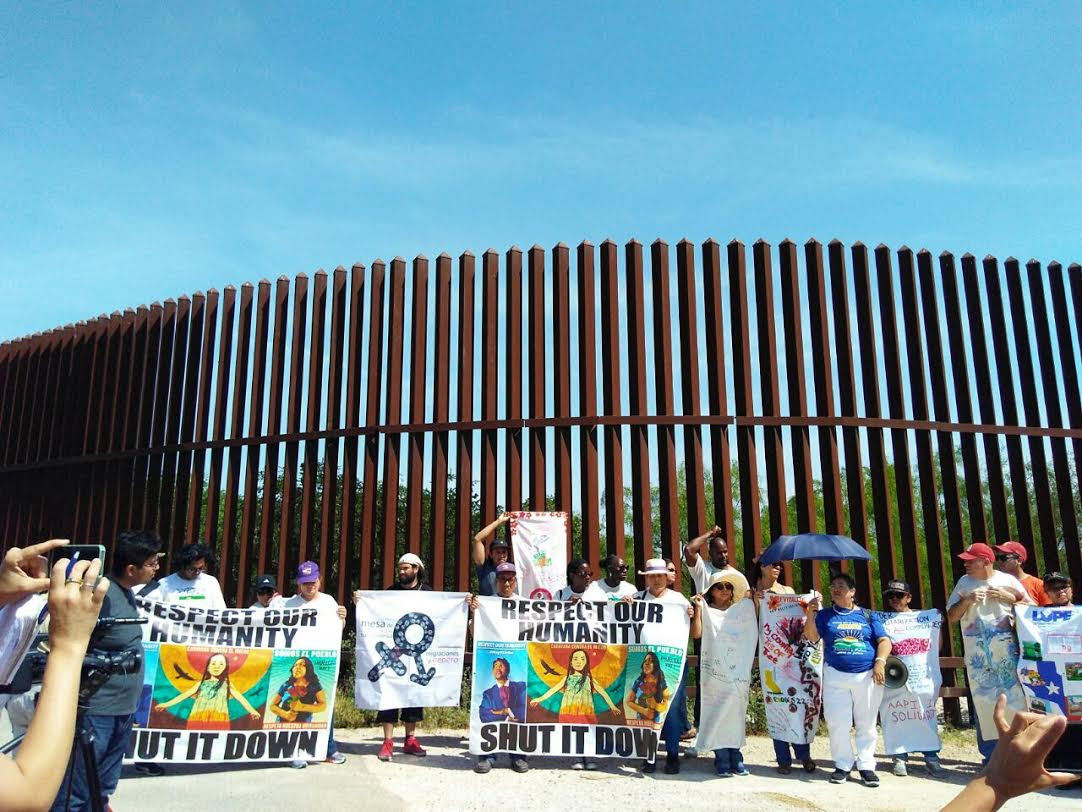

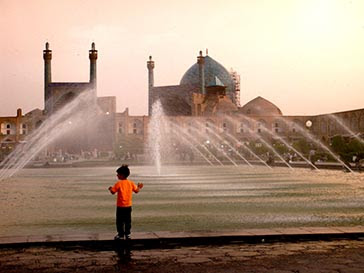

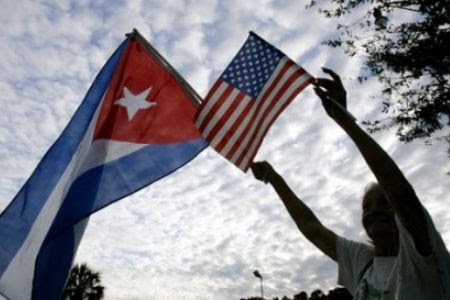


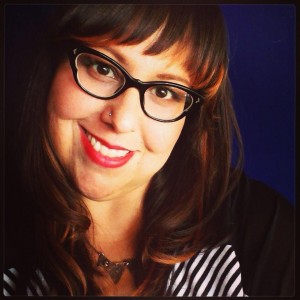
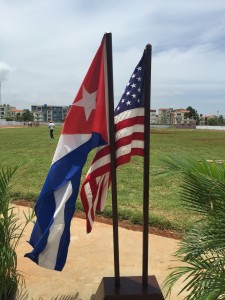 Last week, the United States and Cuba
Last week, the United States and Cuba 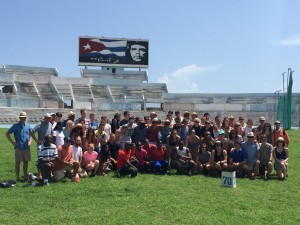
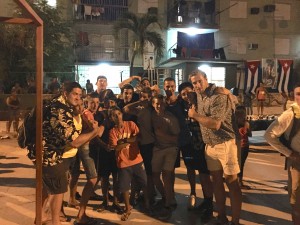 A highlight of the trip was watching the intermingling of students and students, coaches and coaches, athletes and athletes. Broken Spanish and English was attempted, and many smiles, handshakes, high fives and hugs were exchanged. It epitomized the essence of a People-to-People exchange and Citizen Diplomacy – the idea that, even if our governments haven’t always liked or talked with each other, that doesn’t mean the people cannot.
A highlight of the trip was watching the intermingling of students and students, coaches and coaches, athletes and athletes. Broken Spanish and English was attempted, and many smiles, handshakes, high fives and hugs were exchanged. It epitomized the essence of a People-to-People exchange and Citizen Diplomacy – the idea that, even if our governments haven’t always liked or talked with each other, that doesn’t mean the people cannot.